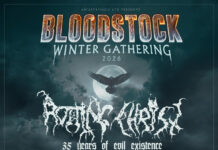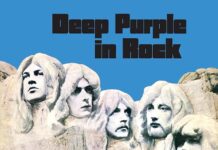Those coming to this hefty 252-page book devoted to the memory of John Wetton, looking exacting details on his life, and more so minutiae on the many bands he played with, or what gauge strings he used on which bass on some classic song or other will be disappointed. The truth is, they’d simply be looking to verify details listed elsewhere down the years, and no doubt repeated inaccurately a time or two. Rather this book consists of personal recollections about the man, testimonials and memories alike.
There are common threads, differences too, and between them a character is drawn, the end result of which may lead many to regret the fact they never got to spend half hour in the man’s company themselves.
A member of Britain’s proud rock history tapestry he performed in bands such as Family, King Crimson, Uriah Heep, Wishbone Ash, Roxy Music, UK, and most successfully Asia. No doubt, many readers will be playing such albums, alongside his solo work, from their collections as they gorge on the various anecdotes and recollections of family and friends alongside the celebrity band members names who contribute. So too should you seek out records now rare or more diverse where previously you never knew he’d been involved – I’d always assumed Mogul Thrash (who by circuitous route evolved into the Average White Band) was where it began professionally, how wrong was I, for aside from working with Helen Shapiro in the late sixties, another female in Annie Haslam, first met him he came to “fill-in” on bass for Renaissance temporarily, they would lose touch down the years, but as many testify, it was her who helped the Wetton beat alcoholism.
Alas, just how Asia formed seems to differ between both band members and those linked with them business wise at the time. Personally, I always thought it was down to mangers missing out on income from progressive rock bands touring the USA needing to fill a void, and there seems to be some question about Wetton’s name value (but not talent) at the time, though I’m sure Wetton himself said in an interview that John Kalodner declared that he had the voice and songwriting talents all he needed to do was put the right band around him. The same story he fed David Coverdale with Whitesnake. Thus, we got more mainstream appealing hit songs rather than the last hurrah of British prog rock in UK, though it was pleasing to read details on the Wetton, Wakeman & Bruford band that nearly was prior to, and that my schoolboy memory of a Melody Maker sidebar wasn’t completely of my own imagination.
Collated with the supervision of Wetton’s family and management, An Extraordinary Life takes a generally chronologically order, his brother, Robert Wetton, leading the way and pinpointing just where it all began, via church choirs and the associated harmonies and melodies found in its music. Robert, it seems, became a professional church organist, John chose rock ‘n roll but had an ear for otherly music too. Richard Palmer-Jones follows swiftly after, King Crimson fans will know his name as lyricist during Wetton’s period with the group, though people tend to forget he was the original guitarist in Supertramp.
The pair were school chums at Bournemouth School for Boys, played in groups together, back in the day when they’d get in a clapped-out van, travel miles and not make enough money to cover petrol, and beyond. Palmer-Jones moved to Germany after leaving Supertramp but would often see Wetton when played there with acts such as Uriah Heep, and herewith we get the first indication of what was the 70s drinking culture, as expressed in print by others, such as guitarist Mick Box, during this book, but for some it extended beyond just liking a drink.
Look at the photos in this collection, or on records from the period, and as many attest, John Wettton, was good looking bloke – A man’s man, the kind that would catch many a lady’s eye even as he was chatting about football (commented on by several involved) with mates. That he also thought deeper about other subjects, and possibly had an invert’s shyness also becomes apparent, and was only able to latterly able to express them in song, another signpost to what might have led to a dependency on drink.
These matters are not shied away from. Those who knew him as a young man reveal their shock in finding he was abusing himself via his need for alcohol. So too we find female partners who dealt with the stresses of coping with this, and it being decidedly unpleasant at times. Yet, even within such passages, both the gentle man he could be and wider reflections on the times and success he had are briefly acknowledged – while his time in King Crimson arguably remains his creative highpoint, it’s his relatively short stint in Uriah Heep that paid for a house in London. The younger musicians Wetton would work with in his latter career are just as valid for their input, as they express both admiration, concerns and frustrations experienced as the man walked towards the light of salvation.
It transpires, Annie Haslam, was filled with a selfless need to help Wetton, based on a phone call. She flew from the USA to England, and with his manager helped get him into The Priory, and eventually she stopped drinking. Details are not gone into, but this appears to be simply down to friendship and the spiritual love for one’s fellow man – We should all sup on that cup of human kindness. That we then learn tales of how the man who helped MTV become such a force of nature during its heyday, thanks to Asia’s videos for his international hit songs, would drive round, picking up drunks ensuring they got home safely brings a tear. If someone does you a good turn, pass it on.
Guitarist Robert Fripp has been vocal in recent times about how proud he is of the way his King Crimson bass player turned his life around. You’ll also get memories from other six string wizards like Steves Howe and Hackett, Phil Manzanera and Dave Kilminster, drummers like Bill Bruford and Carl Palmer, keyboard players like Rick Wakeman and Geoff Downes, and even Martin Turner, who Wetton replaced in Wishbone Ash, has worthy comments to make.
We’ll put aside that someone mistakes his playing on a particular Roxy Music single (John Gustafson, recorded that one), but his own achievements in the pop world are righty outlined via his work with Asia – And how his split from them, then reforming the original line-up with successful tours helped provided the cherry on the cake, once the demon drink was put carefully to one side.
Alas, life’s a bitch and cancer entered his life, a brave fight, with loved ones around was not enough, the great gig in the sky awaited. That he appeared to do so with dignity, yet another proud achievement. But let me not lead you astray here, while his problems are outlined fully, the good times shared with friends and family outweigh them and you’ll find yourself smiling along as you read such passages. John Wetton’s life should be considered a success, and as you’ll find out for yourselves, it was also extraordinary.
John Wetton An Extraordinary Life is available by going to this official link.



















